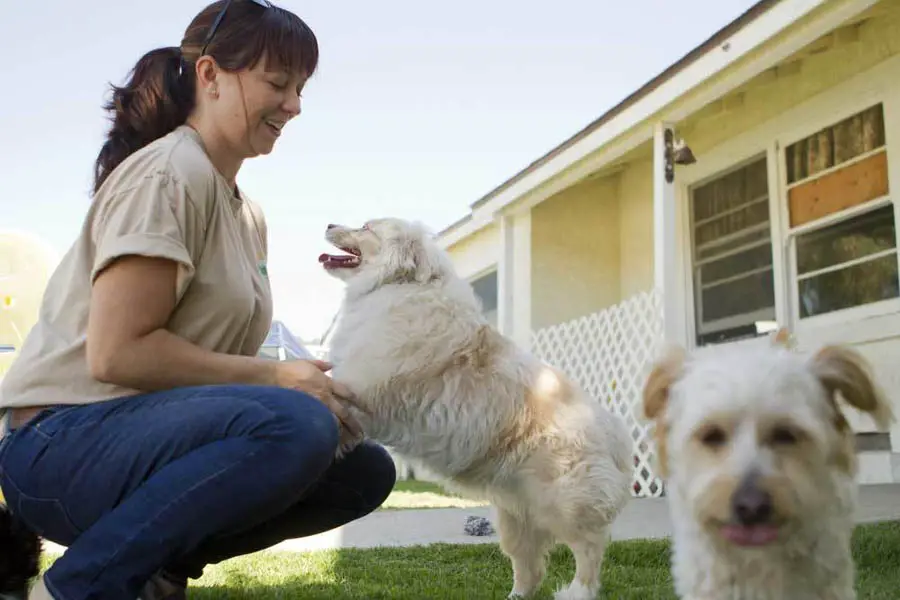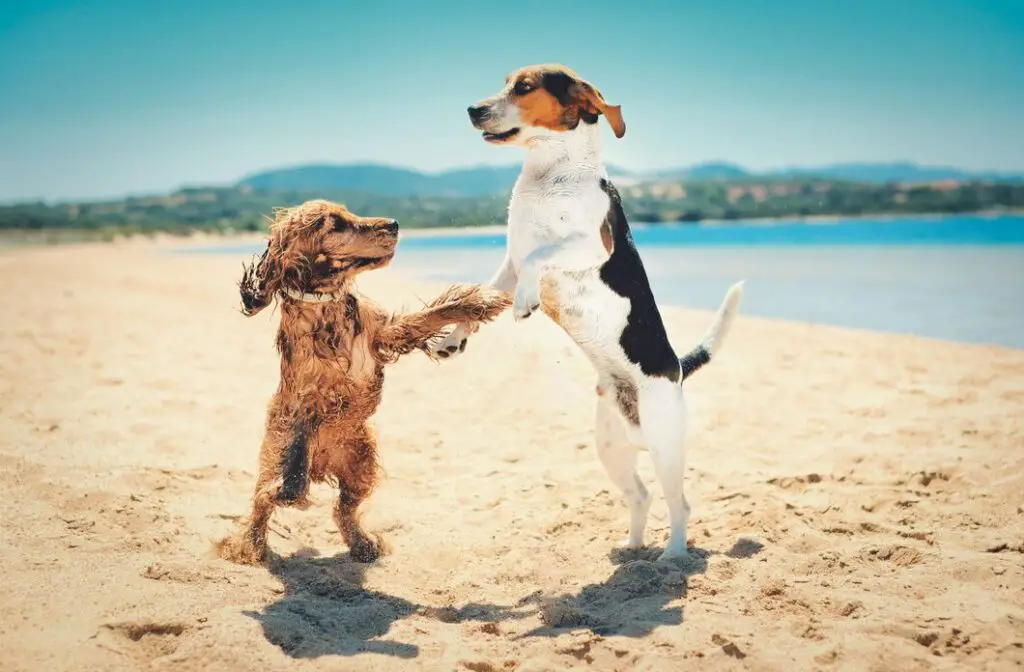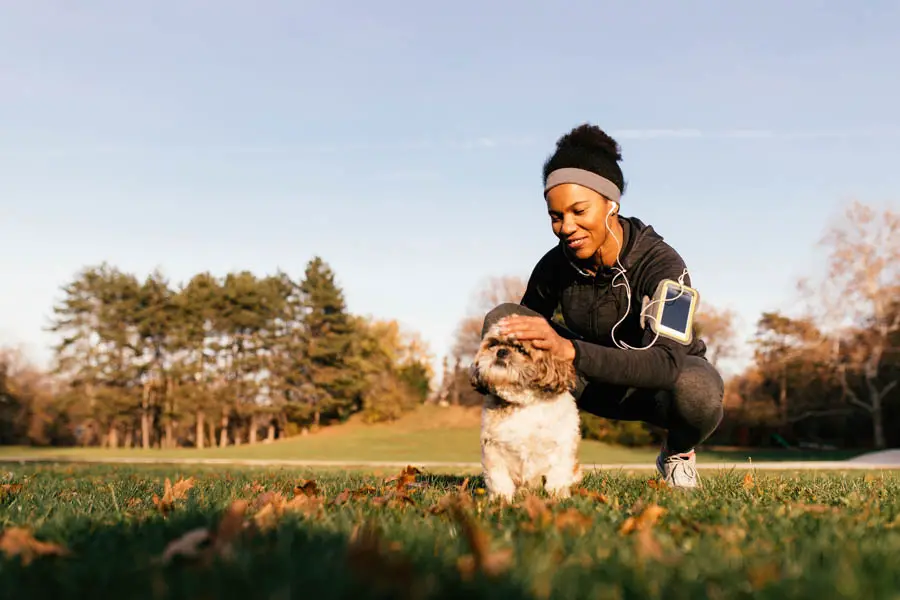You might wonder what’s causing your dog to continuously open and close his jaws and whether you should be concerned. The causes of this behavior can vary.
Only guesses can be established about what causes particular actions in dogs until they can communicate.
Investigating the issue and seeing the vet if the behavior continues is the best strategy to identify the cause of the issue.
It’s always wise to be safe and have your dog checked out by your veterinarian because the causes of a dog repeatedly opening and closing the mouth and jaw may vary, and some causes can be worrying.
1. Your Dog Has Food Stuck in His Mouth

It’s likely nothing serious to worry about if your dog simply opens and closes his mouth after eating.
Dogs lack toothpicks to remove food fragments lodged between their teeth, and although they can move their tongues, dogs’ tongues are not as good at removing food particles lodged along their gum lines.
Starchy kibble tends to stick to a dog’s teeth, which the animal may find unpleasant. What, then, can they do to get rid of any food debris stuck along the gum line?
After eating, dogs use their methods, such as smacking their lips and opening and closing their jaws, to remove sticky things from their teeth.
Dog owners can help when their dog repeatedly opens and closes its mouth after eating by brushing the dog’s teeth (if the dog permits it) or simply wrapping a finger in some gauze and removing the unpleasant food.
With dogs who dislike having their mouths handled, caution is advised.
You might want to talk to your vet to find out what’s causing your dog’s discomfort if he keeps opening and closing his jaw after meals or if the habit occurs outside of mealtime.
2. Smells Your Dog Finds Interesting
Dogs may also repeatedly open and close their mouths after sniffing something piques their interest.
Dogs will clatter their teeth when they sense a scent because a unique duct is on the roof of their mouth, allowing scent molecules to reach their vomeronasal organ.
3. A Foreign Substance is Present

When a dog opens and closes his mouth repeatedly, there may occasionally be some foreign object lodged in the dog’s mouth, which prompts the dog to try to get rid of it.
When there is something in their mouth that shouldn’t be there, dogs quickly notice it.
What might get lodged inside the dog’s mouth? It might be a shard of bone, plastic, grass, wood, or even a grass awn that found its way between the teeth that are back in the mouth.
A stick can occasionally end up directly across the dog’s mouth roof.
It can sometimes be difficult to identify the problem’s root cause.
If your dog would let you, you might find it useful to check his mouth for any foreign things that might be there.
However, exercise caution because not all dogs enjoy having their mouths handled.
Taking the dog to the vet for a more accurate diagnosis is recommended if it is impossible to check the dog’s mouth.
Some canines may become even more agitated and agitated, pawing at their mouths and rubbing their faces in fear.
It might be more beneficial to tape the behavior and then show the veterinarian the recording.
A film is worth 1,000 words describing specific behaviors that can sometimes not be reproduced in the veterinarian’s office.
4. An Issue with the Mouth
A probable issue in the dog’s mouth is another reason it might constantly open and close its mouth.
For instance, a broken tooth may feel strange to a dog, who may then open and close his mouth to avoid the foreign object.
The “feeling different” of a dislodged and loose tooth may also cause this behavior.
Even a wound within the mouth, an oral lesion (such as a lump or bump), or being stung by a bug could be to blame.
Dog owners may not always be aware of issues with their dog’s mouth.
If the issue is a chipped tooth that is difficult to spot, even peeking into the dog’s mouth may be ineffective.
Dogs aren’t always cooperative, and some parts of their mouth may be difficult to see.
A trip to the vet could be instructive in this situation because the doctor could examine the dog’s mouth more closely, perform a thorough oral examination (sedation may be required occasionally), and, if necessary, order some dental x-rays if there is a possibility that the dog has a problematic tooth.
5. Symptoms of Nausea

Consider that your dog may be experiencing nausea if he is smacking his lips and opening and closing his mouth frequently.
Similar to humans, dogs spit more when they begin to feel queasy.
This buildup of saliva is not accidental; it guards the dog’s mouth and tooth enamel from the stomach acids in dog vomit, which are very acidic.
When your dog vomits or when he starts to feel better on his own, the incident should end if he is smacking his lips and opening and closing his mouth as a result of nausea.
But occasionally, there can be an underlying issue that needs to be resolved.
Dogs’ nausea may result from ingesting poisonous substances, something that didn’t sit well with the dog’s stomach, or even underlying systemic problems.
6. A Distemper Symptom
Fortunately, due to dog vaccination against this disease, distemper is not a particularly frequent sickness in dogs.
Therefore, unvaccinated dogs are at a higher risk for this. Since distemper is a fundamental vaccination that veterinarians advise against, most dogs are protected against it.
It is the DHLPP vaccine’s “D” component.
The virus that causes canine distemper targets dogs’ digestive, neurological, and respiratory systems.
In addition to other dogs, the disease can also be spread by foxes, wolves, coyotes, raccoons, and skunks.
Similar to a cold, transmission happens by airborne exposure, such as coughing and sneezing or sharing water and food bowls.
Watery eyes, fever, nasal discharge, thicker foot pads, coughing, lethargy, loss of appetite, and vomiting are symptoms that affect affected dogs.
7. Consuming a Bitter Food
Dogs tend to have a strong inherent dislike of bitter flavors.
They might drool and keep opening and closing their mouth if they accidentally take anything bitter or acidic.
Dogs may consume various bitter substances, ranging from non-harmful to extremely toxic. These are a few bitter foods that dogs may consume:
8. Domestic Cleaners
Many common cleaning supplies can taste harsh, and some of the active chemicals, like bleach and ammonia, can be poisonous to dogs if consumed.
9. Harmful Plants
Some herbs that are poisonous to dogs could taste bitter. Although the bitter taste should be enough to dissuade dogs, some curious canines may nevertheless nibble on them.
Daffodils, lilies, and azaleas are a few examples of plants that are poisonous to dogs and bitter.
10. Medications
The taste of many drugs is bitter. Dogs may, nonetheless, lick them before spitting them out.
There are numerous other bitter drugs outside those commonly associated with treating heart disease or high blood pressure in humans.
When sprayed over the furniture, the bitter flavor should deter the dog from chewing on it.
If the dog licks it off, it can make him drool and gnaw his teeth.
11. Toxic Toads
In the USA, two species of toads are well-known for being venomous.
The Sonoran Desert toad, also known as the Colorado River Toad (incilius alvarius), and the huge toad, also known as the marine toad or cane toad (Rhinella marina), which can be found in south Texas, Hawaii, and southern Florida.
The bitter taste of both toads is known to cause dogs to drool, slap their lips, and open and close their mouths.
12. Emotional Problem
Additionally, we can observe a dog opening and closing his mouth and chattering his teeth in response to either positive or unpleasant stress.
For instance, does your dog make a noise with his teeth chattering while you prepare his meal or grab his leash? In that case, enthusiasm or anticipation is probably to blame.
This is comparable to a kid fidgeting in their seat or someone tapping their fingers tensely on a table.
Some dogs may also whirl their teeth while playing or when they are content and joyful after being petted.
To lessen their worry, it may be best to address the underlying emotions causing your dog’s teeth to chatter while in circumstances like going to the clinic or meeting strangers.
The Significance of Visiting a Veterinary
It is important to have a veterinarian look at the situation if your dog repeatedly opens and closes his mouth. Biting the air may occasionally be brought on by a condition affecting the eyes, the digestive system, or the behavior.